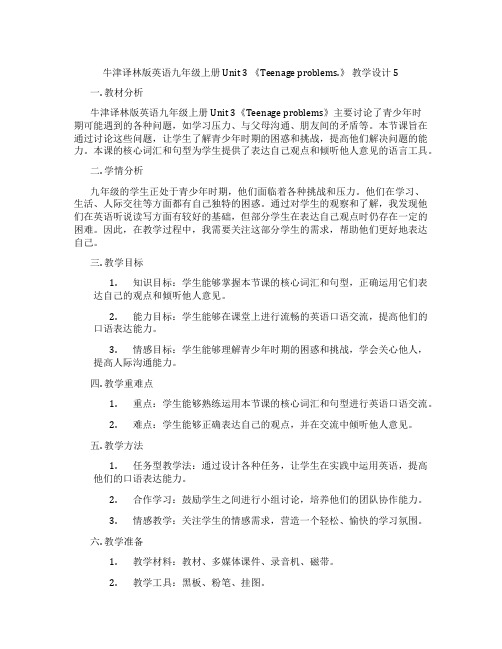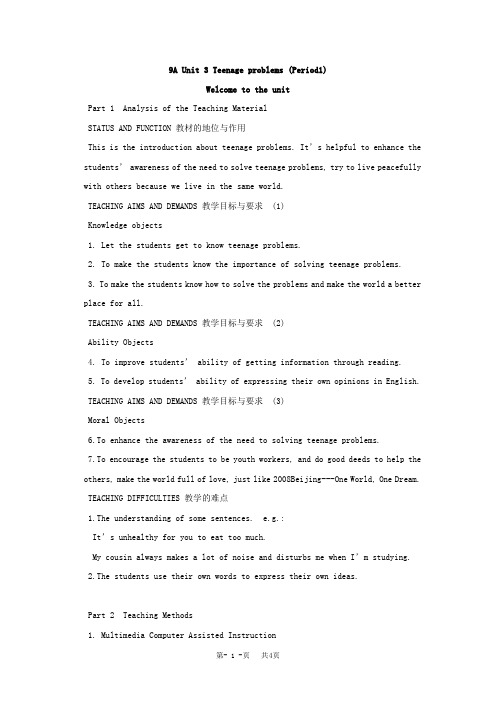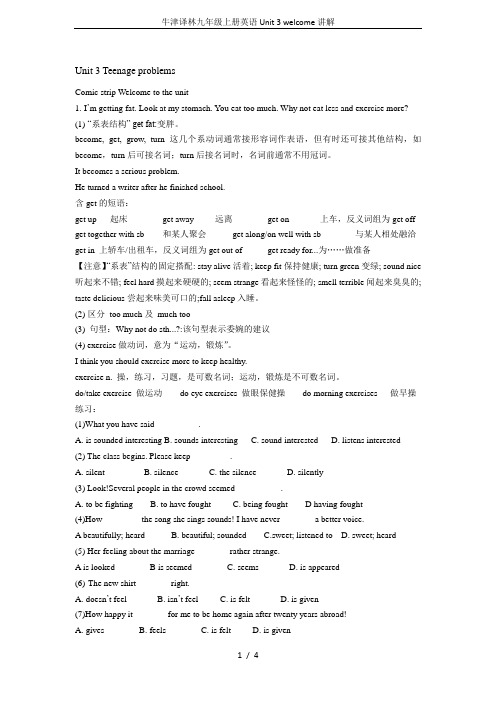九年级英语上册《Unit 3 Teenage problems》Welcome to the uni
牛津译林版英语九年级上册 Unit 3 《Teenage problems.》 教学设计5

牛津译林版英语九年级上册 Unit 3 《Teenage problems.》教学设计5一. 教材分析牛津译林版英语九年级上册Unit 3《Teenage problems》主要讨论了青少年时期可能遇到的各种问题,如学习压力、与父母沟通、朋友间的矛盾等。
本节课旨在通过讨论这些问题,让学生了解青少年时期的困惑和挑战,提高他们解决问题的能力。
本课的核心词汇和句型为学生提供了表达自己观点和倾听他人意见的语言工具。
二. 学情分析九年级的学生正处于青少年时期,他们面临着各种挑战和压力。
他们在学习、生活、人际交往等方面都有自己独特的困惑。
通过对学生的观察和了解,我发现他们在英语听说读写方面有较好的基础,但部分学生在表达自己观点时仍存在一定的困难。
因此,在教学过程中,我需要关注这部分学生的需求,帮助他们更好地表达自己。
三. 教学目标1.知识目标:学生能够掌握本节课的核心词汇和句型,正确运用它们表达自己的观点和倾听他人意见。
2.能力目标:学生能够在课堂上进行流畅的英语口语交流,提高他们的口语表达能力。
3.情感目标:学生能够理解青少年时期的困惑和挑战,学会关心他人,提高人际沟通能力。
四. 教学重难点1.重点:学生能够熟练运用本节课的核心词汇和句型进行英语口语交流。
2.难点:学生能够正确表达自己的观点,并在交流中倾听他人意见。
五. 教学方法1.任务型教学法:通过设计各种任务,让学生在实践中运用英语,提高他们的口语表达能力。
2.合作学习:鼓励学生之间进行小组讨论,培养他们的团队协作能力。
3.情感教学:关注学生的情感需求,营造一个轻松、愉快的学习氛围。
六. 教学准备1.教学材料:教材、多媒体课件、录音机、磁带。
2.教学工具:黑板、粉笔、挂图。
七. 教学过程1.导入(5分钟)利用多媒体展示一些青少年时期常见的问题,如学习压力、与父母沟通等。
引导学生谈论这些问题,激发他们的兴趣。
2.呈现(10分钟)呈现本节课的核心词汇和句型,让学生通过听力练习和小组讨论来熟悉这些词汇和句型。
九年级上册(初三上学期)英语Teenage problems-Welcome to the unit

9A Unit 3 Teenage problems (Period1)Welcome to the unitPart 1 Analysis of the Teaching MaterialSTATUS AND FUNCTION 教材的地位与作用This is the introduction about teenage problems. It’s helpful to enhance the students’ awareness of the need to solve teenage problems, try to live peacefully with others because we live in the same world.TEACHING AIMS AND DEMANDS 教学目标与要求 (1)Knowledge objects1. Let the students get to know teenage problems.2. To make the students know the importance of solving teenage problems.3. To make the students know how to solve the problems and make the world a better place for all.TEACHING AIMS AND DEMANDS 教学目标与要求 (2)Ability Objects4. To improve students’ ability of getting information through reading.5. To develop students’ ability of expressing their own opinions in English. TEACHING AIMS AND DEMANDS 教学目标与要求 (3)Moral Objects6.To enhance the awareness of the need to solving teenage problems.7.To encourage the students to be youth workers, and do good deeds to help the others, make the world full of love, just like 2008Beijing---One World, One Dream. TEACHING DIFFICULTIES 教学的难点1.The understanding of some sentences. e.g.:It’s unhealthy for you to eat too much.My cousin always makes a lot of noise and disturbs me when I’m studying. 2.The students use their own words to express their own ideas.Part 2 Teaching Methods1. Multimedia Computer Assisted Instruction2. Elicitation Method3. Communicative Approach4. Task ApproachPart 3 Learning Methods1). To analyze and solve the problems on the students’ own.2). To get information through watching, reading and listening.3). To be able to guess the meaning of some words and sentences in the reading material with the teacher’s help.Part 4 Teaching ProceduresStep 1 Warming upEnjoy a short piece of music.Step 2 Presentationa. Watch a short flash about a little girl with teenage problems.b. Welcome the students to apply for the youth workers.c. Tell the students to pass three levers if they want to be successful. Step 3 Level OneEddie’s problems (Comic strips)a. Ss listen to the tape.b. Ss answer three questions.c. Practice and act them out.d. Make a dialoguee. Tell the Ss they have passed the first level. (if they are good enough) Step 4 Level TwoTeenage problems (Welcome to the unit)a. Look at the pictures and complete the sentences.b. Deal with the sentences one by one.c. Some new words and difficult sentencesc. Ss read the three sentences.d. Ss give some advice according to these problems.e. Ss give more sentences about teenage problems.f. Page 43 on the Ss’ book, fill in the blanks of part A.g. Tell the Ss they have passed the second level. (if they are good enough) Step 5 Level ThreeYour advice and our hope for the worlda. Do a survey in the class. (Which problem do you think is the biggest problem?)b. How to solve the problems? Ss talk with partners and then make up a dialogue in pairs.c. Some background about teenagers’ opinions.d. Encourage more people to be youth workers to solve teenage problems (Topic: If you want to be a youth worker, what can you do to solve teenage problems?)e. Ss present their advice.f. T presents his own opinion.g. Let our dreams become true.e. 2008---One World, One Dream.Step 6 Certificatea. Ss have passed three levels, give a conclusion.b. Give the certificate to the monitor and ask all the Ss to support from now.c. China---a happy big family; 2008---One World, One Dream.Part 5 Layout on the blackboardTeenage ProblemsPart 6 HomeworkOral work: Try your best to say something about teenage problems.Written work: Finish Ss book on p31-32.Group work: Discuss(讨论) in groups and make a project(课题) about teenage problems.。
九年级英语上册《Unit 3 Teenage problems》Welcome to the uni

Read and act out.
It’s unhealthy for you to eat too much. Try more exercise.
Teenage problems
teenagers
It’s 8 a.m.
He __fe_e_l_s_ tired and __sl_e_e_p_y_. He didn’t get _e_n_o_u_g_h_ _s_le_e_p_.
It’s 4 p.m.
doesn’t have friends He ___________ any close ______ to talk to. He feels _______ . lonely
My parents haven’t come back. They are busy with their work. They don’t have time for me. I have to look after myself. I seldom communicate with them.
Who would you like to telyouth workers in our school your close friends your parents
If you don’t want others to know who you are, how can you get suggestions (建议)?
A survey about students’ problems
◆ Getting too many tests and exams ◆ Not having enough sleep ◆ Too noisy at home ◆ No communication with family members ◆ Having no close friends
九年级英语上册《Unit 3 Teenage problems Comic strip and W

免费下载网址/Unit3 Teenage problemsComic strip and Welcome to the unitTeaching goals:1.知识目标:学习词汇:mark, mad, exam, perhaps, teenage学习词组:get fat, exercise more, get enough sleep, drive me mad, close friends, get low marks in exams, feel sleepy in class, manage your time better学习句子:What’s wrong with …?Why not eat less and exercise more?They don’t have time for me.Perhaps you should manage your time better and go to bed early.2. 技能目标:1) 听懂并掌握与teenage problems有关的词语。
2) 能说出在学习和生活中遇到的问题和烦恼,并给出建议。
3) 掌握提建议的句型。
4) 能就青少年在学习、交友、家庭等方面所遇到的问题展开讨论。
3. 情感目标:帮助学生正确认识在学习和生活中遇到的一些困惑和烦恼,培养学生解决问题的能力,掌握解决问题的方法。
Important and difficult points:1.表达个人问题及解决问题方法2.知识目标+技能目标Teaching procedures:Step1:预习指导与检测见导学案Step2:展示目标见导学案Step3:课堂导学与互动任务一:校对预习检测答案(小组讨论、集体校对、识记并检查词组)。
任务二:学习漫画部分的对话。
1、Free talkWhat’s Eddie’s problem? Do you know?Can you guess why Eddie is getting fat?2、听录音回答问题。
牛津译林版九年级英语上册Unit3 Teenage problems教案

Unit 3 Teenage problemsWelcome to the unitTeaching aims:1. Talk about middle school students in dating, learning, the relationship withthe family problem.2. Think about personal problems and the methods to solve the problem. Teaching procedures:Step 1 Free talkSay some problems these students have in the following pictures1.This student is being scolded by his father.2.They have a lot of homework to do.3.This student is overweight/too fat.4.This student is not very good at running.5.He is being laughed at.Step 2 PresentationLearn some new words.Step 3 Different problems1. Some students in Class 1, Grade 9 have problems. Look at the pictures. Whatproblems do they have? Complete the sentences with the words in the box. friends, homework, marks, noise, parents, sleepKeys: I don’t get enough sleep. I feel tired in class.I don’t have enough time to do my homework.The TV is always on at my home. The noise almost drives me mad.I don’t have any close friends. Sometimes I feel lonely.Sometimes I get low marks in exams. I feel sad.My parents work all day. They don’t have time for me.2. Millie is talking with her mum about teenage problems. Work in pairs and talk about your problems. Use the conversation below as a model.Millie: Mum, many of my classmates have problems.Mum: Really? How about you? Do you have any problems?Millie: Yes, I do. Sometimes I feel sleepy in class.Mum: Oh dear. You don’t get enough sleep.Millie: What should I do then?Mum: Perhaps you should manage your time better and go to bed earlier.Millie: OK. I’ll try.Step 4 Watch a video about Hobo and Eddie.Read and answer the questions.1. What problem does Eddie have?2. What is unhealthy for Eddie?3. What is Hobo’s suggestion?4. Why does Hobo tell Eddie not to eat too much?Step 5 language points1.You eat too much.too much 太多,修饰不可数名词too many 太多,修饰可数名词much too 太……,修饰形容词e.g. Don’t eat ________ ice cream.There are ________ books on the desk.Lily is ________ fat.2. The TV is always on at my home.我家的电视总是开着。
牛津译林九年级上册英语Unit 3 welcome讲解

Unit 3 Teenage problemsComic strip Welcome to the unit1.I’m getting fat. Look at my stomach. You eat too much. Why not eat less and exercise more? (1)“系表结构” get fat:变胖。
become, get, grow, turn这几个系动词通常接形容词作表语,但有时还可接其他结构,如become,turn后可接名词;turn后接名词时,名词前通常不用冠词。
It becomes a serious problem.He turned a writer after he finished school.含get的短语:get up 起床get away 远离get on 上车,反义词组为get off get together with sb 和某人聚会get along/on well with sb 与某人相处融洽get in 上轿车/出租车,反义词组为get out of get ready for...为……做准备【注意】“系表”结构的固定搭配: stay alive活着; keep fit保持健康; turn green变绿; sound nice 听起来不错; feel hard摸起来硬硬的; seem strange看起来怪怪的; smell terrible闻起来臭臭的; taste delicious尝起来味美可口的;fall asleep入睡。
(2)区分too much及much too(3) 句型:Why not do sth...?:该句型表示委婉的建议(4) exercise做动词,意为“运动,锻炼”。
I think you should exercise more to keep healthy.exercise n. 操,练习,习题,是可数名词;运动,锻炼是不可数名词。
牛津译林版英语九年级上册Unit3《Teenageproblems.》说课稿2
牛津译林版英语九年级上册 Unit 3 《Teenage problems.》说课稿2一. 教材分析《牛津译林版英语九年级上册 Unit 3 Teenage problems》是人教版初中英语教材的一个单元,主题是关于青少年问题的讨论。
本单元主要围绕青少年的日常生活中的问题展开,包括学习压力、与父母沟通、网络安全等方面。
通过本单元的学习,学生能够提高自己在现实生活中解决问题的能力,同时增强自己的英语听说读写技能。
二. 学情分析九年级的学生已经具备了一定的英语基础,能够理解和运用一些基本的英语句型和语法知识。
然而,他们在词汇量和语言表达能力方面还有待提高。
此外,由于本单元涉及到一些敏感话题,如网络安全等,学生可能对此有一定的抵触情绪,需要教师进行适当的引导。
三. 说教学目标1.知识目标:学生能够掌握本单元的核心词汇和句型,理解文章的主旨大意。
2.能力目标:学生能够运用所学的词汇和句型,进行日常交流和讨论,提高自己的口语表达能力。
3.情感目标:学生能够认识到青少年问题的严重性,提高自我保护意识,培养积极健康的生活态度。
四. 说教学重难点1.重点:学生能够掌握本单元的核心词汇和句型,理解文章的主旨大意。
2.难点:学生能够运用所学的词汇和句型,就青少年问题展开讨论,提高自己的口语表达能力。
五. 说教学方法与手段1.教学方法:采用任务型教学法,让学生在完成具体任务的过程中,提高自己的英语听说读写技能。
2.教学手段:利用多媒体课件、网络资源等,为学生提供丰富的学习资源,激发学生的学习兴趣。
六. 说教学过程1.导入:教师通过提问方式,引导学生谈论青少年问题,激发学生的学习兴趣。
2.阅读理解:学生通过阅读文章,回答相关问题,理解文章的主旨大意。
3.小组讨论:学生分成小组,就文章中的问题进行讨论,提高自己的口语表达能力。
4.写作练习:学生根据所学内容,写一篇关于青少年问题的短文。
5.课堂展示:学生展示自己的写作成果,其他学生进行评价。
九年级英语上册 Unit 3 Teenage problems Welcome to the Uni
英语备课大师【全免费】Teenage problems班级姓名备课组长教师“个备”或学生笔记栏【学习目标】1.to talk about problems and their causes2.to think about personal problems and how to deal with them.【重点、难点】1.掌握四会词汇。
2.初步了解宾语从句【课前预习】翻译词组1.足够的睡眠_________________________2.电视一直开着________________________3.没有亲密的朋友________________________4.感到孤独________________________5.使----发疯________________________6.有太多的测验________________________7.考试得分低________________________8.吃得太多________________________【学习过程】step1Presentation T:I m very happy today , bea use I … Are you happy today(Y es, … Are you happy every day?)Step 2Skills T shows the pictures:Today I will show you some pictures of thestudents in Class 1, Grade 9. Can you tell me t heir problems?,Step3Exercises T:We have some sentences under each picture on Page 43Can you finish them now?1. I don’t get enough ________. I feel tired in class.2. I don’t have enough time to do my __________.3. The TV is always on at my home. The ________ almost drives me mad.4. I don’t have any close __________ to talk to. Sometimes, I feel lonely.5My cousin always makes a lot of noise and _________ me when I’mstudying.6. My ___________ work al l day. They don’t have time for me.Step4Discussion T:Now, we know more problems. In Part B you can see all ofthem Can you discuss in groups a nd write 1----5 next to each problem thentell us your idea?lessons we will find more students who have the same problems with us. At the same time, we will find ways to solve our problems.Step 5Presentations T:You ‘v e done a good job. You know that everyone has the ri problems. Then, how about our old friend Eddie. Let’s listen to the tape and answer the questions. 1. What’s Eddie’s problem? 2. What’s Hobo’s advice?(建议) 3. What’s Eddie’s new problem?Step 6Exercise【当堂训练】根据句意和中文提示写出单词。
牛津译林版九年级英语上册教案Unit 3 Teenage problems Welcome
Unit 3 Teenage problemsWelcomeThe type of the lesson:WelcomeTeaching Objectives:1.to talk about problems and their causes2.to think about personal problems and how to deal with them.Teaching Emphasis:1 . Hobo, I﹐ve got a problem.2. Eating too much is bad for you.3.Everybody has problems sometimes.4.It’s very noisy at home.Teaching steps:Step 1 GreetingStep 2 LearnShow some pictures to the students, let them to learn some new words of this unit.teenageStep 3 DiscussA few students in Class 1, Grade 9 have some problems. What problems do they have?I don’t get enough __________. I feel tired in class.I don’t have enough time to do my ___________.The TV is always on at home. The _____ almost drives me mad.I don’t have any close ________ to talk to. Sometimes, I feel lonely.My cousin always makes a lot of noise and __________me when I’m studying.My ___________ work all day. They don’t have time for me.Step 4 Make a surveyA survey about students’ problems:What other problems do you have?What is the most common problem?(the smallest problem, the biggest problem)Step 5 Listen to the tape.Let the students to listen to the tape carefully. Pay attention to the words.Step 6 Ask and answer.After listening to the tape, let the students ask and answer in pairs.1.What’s Eddie’s problem?He’s getting fat. His stomach is big.2.Why is that?Because he always eats too much. It’s unhealthy for him to eat too much.3.What should he do then?He should try more exercise.4.What does Hobo say then?He says,“I’ll finish the food for you then.”Step 7 Read the text.Let the students read the text after the tape sentence by sentence. Try to remember them inclass.Step 8 Some language points.1.teenage problems2. have got a problem 有问题/麻烦3.I’m getting fat.4. It’s unhealthy for you to eat too much.=Eating too much makes you unhealthy.5.ask his students to write to their penfriends about their problems6.deal with the problems of stress7.get enough sleep8.feel tired in class9.I don’t have enough time to do my homework.10.The TV is always on at my home.11.I don’t have any close friends to talk to.12.feel lonely13. A survey about students’ problems14. disturb15.My parents work all day.They don’t have time for me.16.some of the most common problems17.get too many tests and exams18.No communication with family membersHomework1.Copy the phrases.2.Finish the exercise on your workbook.3. Read and recite the text.。
Unit 3 Teenage problems welcome to the unit 教案
英语(九年级上册)Unit 3 Teenage problemsComic strip& Welcome to the unitI. Teaching aims and learning objectivesBy the end of the lesson, students should be able to:1. know more about teenage problems and learn to talk about it;2. give advice to others on their problems.II. Teaching contents1. New words and phrases: mark, mad, exam, perhaps, get fat, get/have enough sleep, haveenough time to do one’s homework, be on, drive sb. mad, getlow/high/full marks, feel tired/sad/lonely/sleepy;2. New structures: Why not eat less and exercise more?Perhaps you should manage your time better and go to bed earlier.III. Focus of the lesson and predicted area of difficulty1. To talk about teenage problems in English;2. To talk about ways to solve teenage problems in English.IV. Teaching proceduresComic stripStep 1 Warming upSing a song: Trouble is a friend.【设计意图:课前热身,通过播放有关英文歌曲,调动学生头脑中已储存的与单元话题相关的背景知识,使学生轻松愉快地参与到课堂活动中。
- 1、下载文档前请自行甄别文档内容的完整性,平台不提供额外的编辑、内容补充、找答案等附加服务。
- 2、"仅部分预览"的文档,不可在线预览部分如存在完整性等问题,可反馈申请退款(可完整预览的文档不适用该条件!)。
- 3、如文档侵犯您的权益,请联系客服反馈,我们会尽快为您处理(人工客服工作时间:9:00-18:30)。
We get too many tests and exams. I feel stressed. And there is too much homework to do every day. But I don’t have enough time.
teenagers
It’s 8 a.m.
He __fe_e_l_s_ tired and __sl_e_e_p_y_. He didn’t get _e_n_o_u_g_h_ _s_le_e_p_.
It’s 4 p.m.
He _d_o_e_sn_’_t_h_a_v_e_ any close _fr_i_e_n_d_s to talk to. He feels _l_o_n_e_ly__ .
Homework
1. Recite the dialogue. 2. Finish Period 1.
on the Internet
write to a pen friend
tell a youth worker on the phone
Rainbow is always after the storm.
I believe I can fly If I can see it, then I can do it If I just believe it, there's nothing to it I believe I can fly I believe I can touch the sky I think about it every night and day Spread my wings and fly away
My parents haven’t come back. They are busy with their work. They don’t have time for me. I have to look after myself. I seldom communicate with them.
பைடு நூலகம்
Who would you like to tell about your problems?
Ms Zhang the youth workers in our school your close friends your parents
If you don’t want others to know who you are, how can you get suggestions (建议)?
A survey about students’ problems
◆ Getting too many tests and exams ◆ Not having enough sleep ◆ Too noisy at home ◆ No communication with family members ◆ Having no close friends
3.What will happen to Eddie’s food then? Hobo will eat the food.
Read and act out.
It’s unhealthy for you to eat too much. Try more exercise.
Teenage problems
What problems do you have?
Have a competition
Group A
Group B
problems
advice
Work in groups of four.
students problems
A
…
B
…
C
…
D
…
advice
… … … … … … … … … … … …
Unit 3 Teenage problems Welcome to the unit
1.What’s Eddie’s problem? He’s getting fat.
2.What advice does Hobo give to him? Hobo advised Eddie not to eat too much, but to try more exercise.
It’s 6.30 p.m.
The _T__V_ is on while she __is_d_o_i_n_g_her homework. It’s too __n_o_i_sy__. The noise almost drives _h_e_r_ mad.
It’s 8:30.
Her sister m__a_k_e_s a lot of n__o_is_e_ and always disturbs her _w_h_e_n__she is studying.
